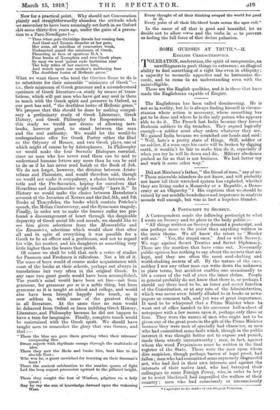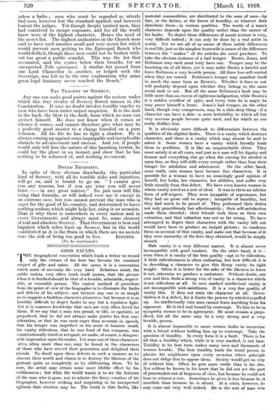SOME GUESSES AT TRUTIL*—II.
ENGLISH CILIRACTRRISTICS.
TOLERATION, moderation, the spirit of compromise, an unwillingness to push things to extremes; an illogical ability to find something of a right line even in obliquity ; a capacity to reconcile opposites and to harmonize dis- cords, and to come to an understanding even with the unintelligible.
These are the English qualities, and it is these that have made the Englishman capable of Empire.
The Englishman has been called domineering. He is not so in reality, but he is always finding himself in circuni- stances where action is necessary, where something has got to be done and where he is the only person who appears able to do it. The French lost India because they forced Brahmin soldiers to dig trenches. They argued logically enough—a soldier must obey orders whatever they arc. We gained India because we scratched our heads and said: " Well, here's a pretty state of things. Still, soldier or no soldier, if a man says his caste will be broken by digging earth, it wouldn't be fair to make him do it, especially H when you try he will lie down and die. Military obedience pushed as far as that is not business. We had better try and work it some other way."
Did not Mirabeau's father, " the friend of man," say of us : " These miserable islanders do not know, and will probably not know till their wretched system has exploded, whether they are living under a Monarchy or a Republic, a Demo- cracy or an Oligarchy " I His ergotism that we should be ruined by our muddle-headedness and impotence in analysis sounds well enough, but was in fact a hopeless blunder.
A POSTSCRIPT TO SECRECY.
A Correspondent sends the following postscript to what I wrote on Secrecy and its place in the body politic :— "All things written on Secrecy demand a postscript, and one perhaps more to the point than anything written in the main theme. We all know the retort to Murder
will out.' Yes, the stupid ones.' And so with Secrecy. We rage against Secret Treaties and Secret Diplomacy. These are the murders that have come out. Necessarily public opinion has nothing to say about the secrets that are kept, and they are often the most soul-shaking and world-shaking secrets of all. By the nature of the case, neither I nor any other man can write down the unknown in plain terms, but accident enables one occasionally to lift a corner of the veil of even the inner shrine. People in general probably do not know that there is, or perhaps I should say there used to be, an inner and secret function of the Constitution, or at any rate of the Administration, which was never even faintly alluded to in books or news- papers or common talk, and yet was of great importance. It used to be whispered that a Prime Minister when he went out of office handed to his successor half-a-sheet of notepaper with a few names upon it, perhaps only three or four. They were the names of men who ought not to be given any of the great poste in the gift of the Prime Minister because they were men of specially bad character, or men who had committed some fault which, though in the public interest it was thought better not to expose and punish, made them utterly untrustworthy ; men, in fact, against whom the word Turpissimus must be written in the final register of the State. These were the men upon whom dire suspicion, though perhaps barren of legal proof, had fallen ; men who had committed some supremely disgraceful act, who had lied in their own interests and against the interests of their native land, who had betrayed their colleagues to some Foreign Power, who, in order to levy or to resist blackmail, had imperilled the welfare of them country ; men who had consciously or unconsciously
• I apologIne to the vhade• of tee eloquent VletorLIns.
taken a' bribe ; men who must be regarded as utterly bad men, however low the standard applied, and however lenient the judges. Yet though deeply tainted men, they had contrived to escape exposure, and for all the world knew were of the highest character. Hence the need of the secret list. The highest authorities in the Church were said to have such another small and very secret list which would prevent men getting to the Episcopal Bench who woulddefile it, though these men could not be broken with- out too great a public scandal. This was the list that accounted, said the cynics below their breaths, for an tinexpected Nolo episcopari. A similar list passed from one Lord Chancellor to another, or lodged with the Sovereign, was felt to be the true explanation why some great legal luminary never reached the Bench."
THE TRAGEDY OF SECRECY.
Any one can make good points against the system under which this tiny rivulet of Secrecy flowed unseen in the Constitution. It may no doubt involve terrible cruelty to men who have been under unjust suspicion. It is the stab in the back, the blow in the dark, from which no man can protect himself. He does not know when it comes or whence it comes, and cannot therefore give what may be a perfectly good answer to a charge founded on a pure delusion. All his life he has to fight a shadow. He is always coming up against some impalpable and inexplicable obstacle to advancement and success. And yet, if people would only tell him the nature of this haunting terrror, he could lay the ghost in an instant, and show that he has nothing to be ashamed of, and nothing to conceal.
DREAD NECESSITY.
In spite of these obvious drawbacks, this particular kind of Secrecy, with all its terrible risks and injustices, will go on, and is bound to go on. I cannot give you any reasons, but if you are wise you will never' trust — in any great matter." No just man will like using that formula, or will indeed ever use it except in an extreme case, but you cannot prevent the man who is eager for the good of his country, and determined to leave nothing undone which might help her, using it on occasion. That is why there is somewhere in every nation and in every Government, and always must be, some element of real and absolute Secrecy. That Government is best and happiest which relies least on Secrecy, but in the world constituted as it is the State in which there are no secrets runs the risk of being too good to live. Isucarus.
(To be continued.)







































 Previous page
Previous page